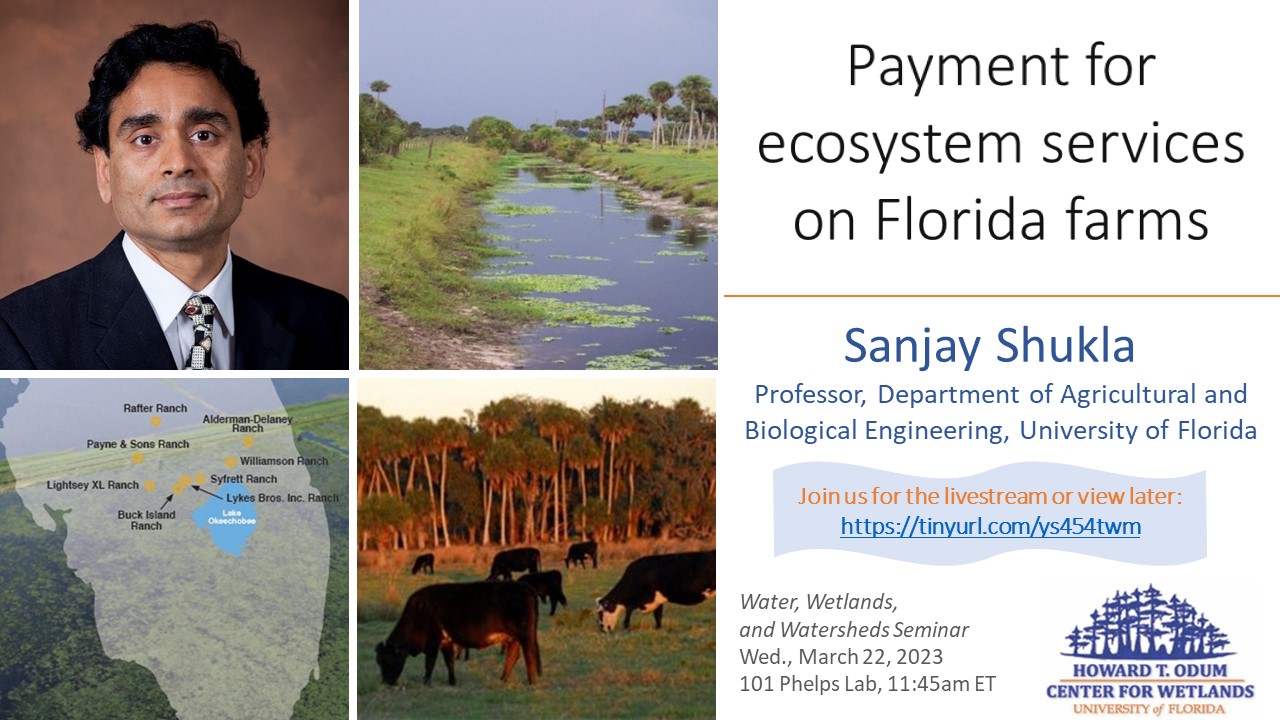
Sanjay Shukla, Professor, Department of Agricultural and Biological Engineering, University of Florida
Join us for the livestream March 22nd, 11:45am ET: https://youtube.com/live/fzxkwJ_Rk2I?feature=share
(Please visit our YouTube channel main page for the stream if there are any issues with the direct link.)
Abstract
The payment-for-environmental-services (PES) concept is increasingly being used to help restore ecosystems. The rationale behind PES is that in some cases, financial incentive is more effective than the regulatory approach. We will discuss two PES studies related to water storage and treatment. The first program, currently referred to as “Water Farming” or “Dispersed Water Management” has its origin in a 2006 pilot project started to store and treat water on private ranchlands in the Everglades basin. Ranchers installed discharge control structures to reduce flows from their ranches. The seller of water services was the rancher, and the buyer was the state of Florida. Results showed that the projects successfully reduced water and nutrient discharges. The average annual total phosphorus (TP) and total nitrogen (TN) treatment efficiency was 60-85%. Economic analyses showed that the PES approach was more economical than the publicly funded storage/treatment systems. Success of the pilot project led to the state launching a basin wide water storage and treatment program. The second study was started in 2012, to evaluate water and nutrient retentions from agricultural stormwater detention areas (SDS). SDS also known as farm ponds, are used to prevent flooding and act as sinks of nutrients to reduce downstream loads. However, long-term fertilizer inputs are causing P saturation of the SDS. Legacy P from SDS can be released to downstream waters, especially after extreme rainfall events. We use data from SDSs in Florida, to develop and evaluate the biogeochemical and economic feasibility of N and P recycling. Implementing a circular economic approach of harvesting and composting (HC), the biomass from SDS is harvested and applied as organic fertilizer to the production fields to help close the nutrient loop. Results showed that harvesting-composting can increase P retention from 50% to 75%. Compost use can increase water, N and P retention while improving soil health. Cost incurred in harvesting and composting can easily be offset by the economic value of the resulting compost and the reduction in the State’s expenditure on regional P treatment systems. Economic analyses showed the treatment costs to be $26-42/kg of P, more than 10 times less than the current state expenditure of $355-$909/kg P using constructed wetlands. A PES program, where producers are paid for P recycling, was proposed as a win-win solution for achieving basin-scale P load reduction. The estimated, potential basin-scale P retention with the PES was more than the P that entered the Everglades Protection Area, at almost 90% less cost than the state-operated treatment systems. In addition to water services, additional studies are ongoing to evaluate services of carbon sequestration and biodiversity, selecting sites for PES programs and analyzing trade-offs and synergies between water and desirable and undesirable biodiversity. These synergies and tradeoffs, analyzed with a decision support system, will be briefly discussed.
Bio
Sanjay Shukla is a Professor of Water Resources in the Agricultural and Biological Engineering Department. He is located at Southwest Florida Research and Education Center in Immokalee, FL. He specializes in hydrology, irrigation, and water quality with focus on developing solutions that can influence large-scale changes in agriculture to improve economic and environmental sustainability. He received his PhD from Virginia Tech in 2000 in Biological Systems Engineering with specialization in land and water engineering. His recent selected awards include Virginia Tech Distinguished Alumni, ASABE Netafim Irrigation Award, UF Research Foundation Professor, UF Water Institute Distinguished Fellow, Wells Fargo Extension Award, and UF Graduate Student Council Exemplary Faculty Award.
Postcard
